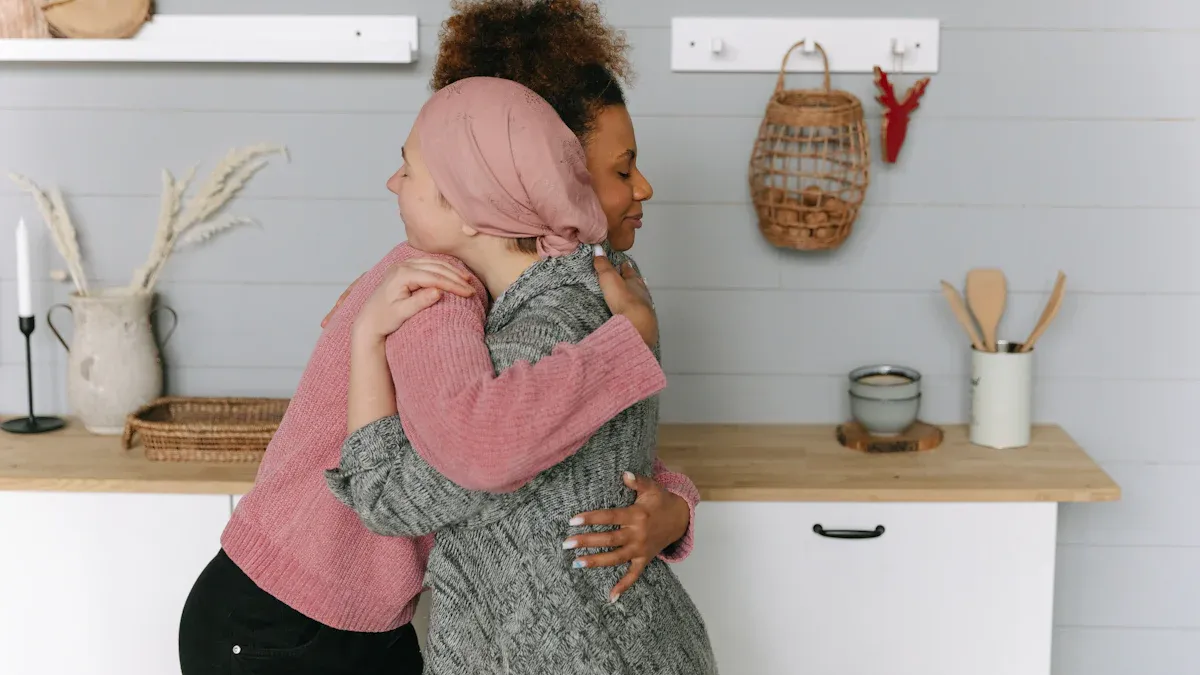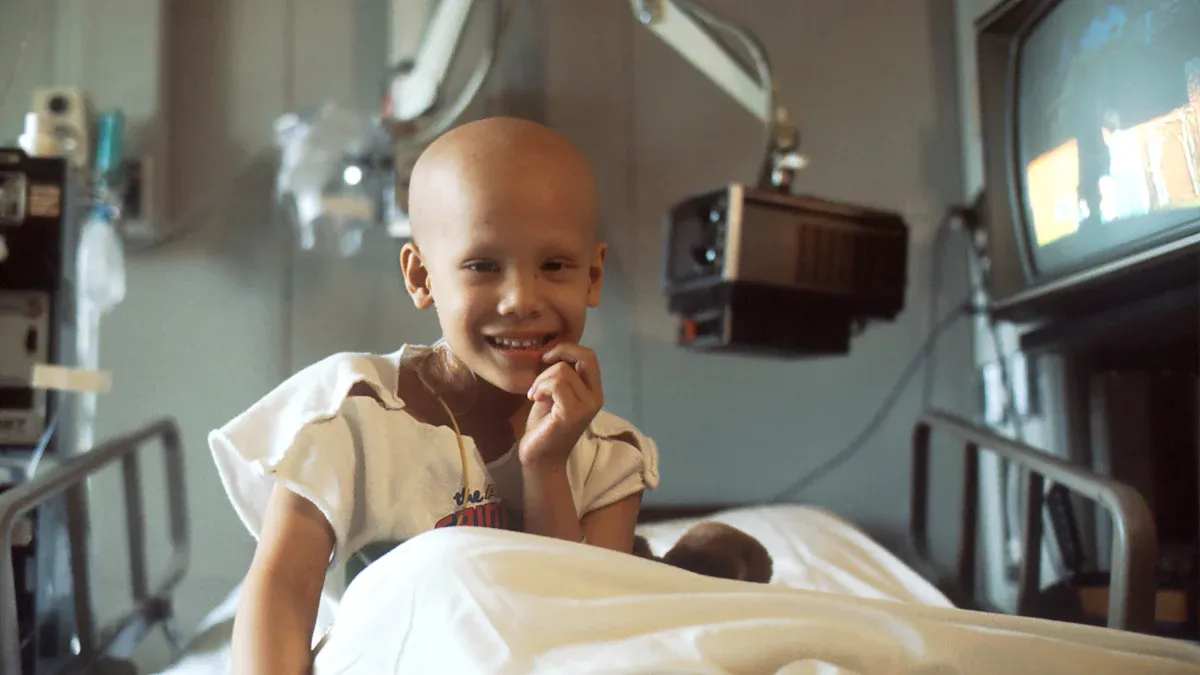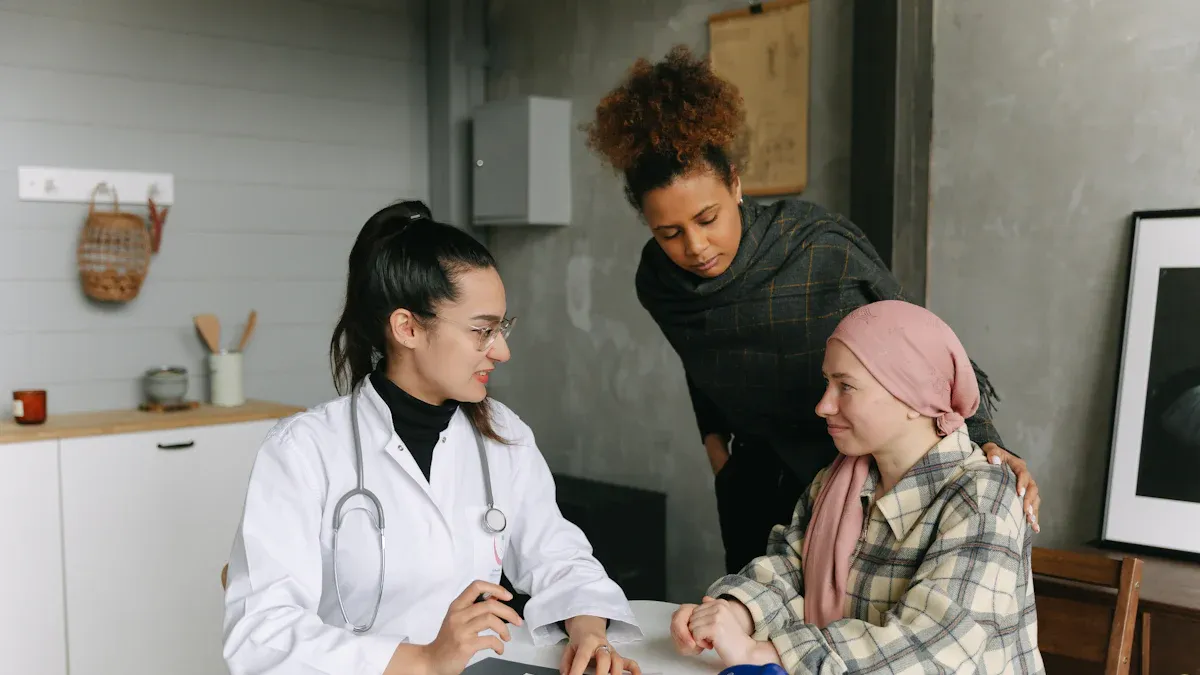How to Find Emotional Support After Cancer Treatment

Finishing cancer treatment is a huge milestone, but it can leave you with a mix of emotions. You might feel relief, but also fear, sadness, or even loneliness. These feelings are normal. In fact, many cancer survivors report that fear of recurrence is one of the most common emotional struggles they face. Anxiety and distress can linger, especially when you're adjusting to life after treatment.
The good news? You're not alone, and there are ways to heal emotionally. Whether it's through connecting with loved ones, joining a support group, or seeking professional help, support is out there. Emotional healing: counseling and support groups post-cancer can make a big difference in helping you feel understood and less isolated. Remember, it's okay to ask for help. Taking small steps toward emotional well-being can lead to a brighter, more balanced future.
Key Takeaways
Understand your feelings. It's okay to feel happy, scared, or sad after treatment. Accepting these emotions helps you start to heal.
Get help. Talk to family, join support groups, or see a counselor. Sharing your story can make you feel less alone.
Take care of yourself. Focus on resting, eating healthy, and staying active. Small daily habits can improve how you feel emotionally.
Try journaling and mindfulness. Write about your feelings and practice staying calm. These can help you handle emotions better.
Celebrate little wins. Notice your progress, even if it's small. Every step shows your strength and courage.
Recognizing and Validating Your Emotions
Common Emotional Responses After Cancer
Coping with fear of recurrence
It’s normal to feel anxious about cancer returning. This fear can creep in during follow-up appointments or even when you feel a slight ache or pain. You’re not alone—many survivors share this concern. Studies show that the fear of recurrence is one of the most common emotional challenges after treatment. While it’s impossible to eliminate this fear entirely, you can manage it by focusing on what you can control, like maintaining a healthy lifestyle and attending regular check-ups.
Managing feelings of isolation or sadness
After treatment, you might feel like others don’t fully understand what you’ve been through. This sense of isolation can lead to sadness or even depression. Research highlights that anxiety and distress are more common in cancer survivors than in those without a cancer history. Talking to someone who has walked a similar path, like a support group member, can help you feel less alone. Sharing your story can also bring a sense of connection and relief.
The Power of Acknowledging Your Feelings
Why suppressing emotions can be harmful
Bottling up your emotions might seem like the easiest way to cope, but it can actually make things worse. Studies reveal that suppressing negative emotions can increase stress and hinder recovery. On the other hand, expressing your feelings—whether through talking, writing, or creative outlets—can help you process them and move forward.
Practicing self-compassion and acceptance
Be kind to yourself. It’s okay to feel scared, angry, or sad. Acknowledging these emotions doesn’t make you weak—it makes you human. Self-compassion means treating yourself with the same kindness you’d offer a friend. Accepting your feelings as they are can pave the way for emotional healing. Activities like journaling or mindfulness can help you embrace your emotions without judgment.
Tools for Emotional Awareness
Journaling for clarity and reflection
Writing down your thoughts can be incredibly therapeutic. Journaling helps you identify patterns in your emotions and gives you a safe space to express yourself. It’s a simple yet powerful tool for emotional awareness. You don’t need to write every day—just when you feel the need to sort through your feelings.
Mindfulness exercises to stay present
Mindfulness can help you focus on the present moment instead of worrying about the past or future. Simple exercises like deep breathing or guided imagery can reduce stress and improve your mood. These techniques are especially helpful for managing anxiety and staying grounded during challenging times.
Tip: Start with a few minutes of mindfulness each day. Apps or online videos can guide you through the process if you’re new to it.
Emotional Healing: Counseling and Support Groups Post-Cancer

Seeking Professional Help
Therapists and counselors specializing in post-cancer care
Professional therapists and counselors can play a vital role in your emotional healing. They specialize in helping cancer survivors process complex emotions like fear, anger, and guilt. These experts provide a safe space for you to explore your feelings and develop coping strategies. Many healthcare providers can guide you toward therapists who focus on post-cancer care. They understand the unique challenges you face and can help you regain emotional balance.
Oncology social workers and their role
Oncology social workers are another valuable resource. They’re trained to support cancer survivors emotionally and practically. They can connect you with local resources, financial assistance, or even support groups. Their role goes beyond counseling—they help you navigate life after treatment. If you’re unsure where to start, an oncology social worker can be your first step toward finding the right support.
Exploring Support Groups
Benefits of shared experiences and reduced isolation
Joining a support group can make a world of difference. Sharing your journey with others who’ve been through similar experiences can reduce feelings of isolation. Support groups offer a sense of community and practical advice. Research shows that these groups empower survivors to manage emotional distress and prevent it from escalating into anxiety or depression.
Types of groups: in-person and online options
Support groups come in many forms. In-person groups allow for face-to-face connections, while online groups offer flexibility and convenience. Both options provide a safe space to share your story and learn from others. Whether you prefer the personal touch of in-person meetings or the accessibility of online forums, there’s a group out there for you.
Finding the Right Support
Tips for choosing a therapist or support group
Finding the right fit is essential. Look for therapists or groups that specialize in post-cancer care. Ask about their experience with cancer survivors and their approach to emotional healing. Trust your instincts—if something doesn’t feel right, keep looking.
Questions to ask during your first session
When meeting a therapist or joining a group, ask questions to ensure it’s the right match. For therapists, you might ask about their methods or experience with cancer-related issues. For support groups, inquire about the group’s focus and how meetings are structured. These questions can help you feel more confident in your choice.
Maintaining a Balanced Routine

Self-Care for Emotional Well-Being
Prioritizing rest, nutrition, and physical activity
Taking care of your body is one of the best ways to support your emotional well-being. Rest is essential for recovery, so make sure you’re getting enough sleep each night. A balanced diet filled with fruits, vegetables, and whole grains can boost your energy and mood. Physical activity, even something as simple as a daily walk, can reduce stress and improve your overall outlook.
Engaging in activities like dance or yoga can also help you express emotions and connect with others. Studies show that maintaining a structured routine, including exercise and healthy eating, enhances emotional resilience and self-esteem. It’s not about perfection—small, consistent steps can make a big difference.
Relaxation techniques for stress management
Stress can feel overwhelming, but relaxation techniques can help you regain control. Deep breathing exercises, meditation, or even listening to calming music can lower your stress levels. Creative outlets like painting or journaling can also be therapeutic. Research highlights that activities like music and art therapy provide emotional relief and foster hope.
Tip: Try setting aside 10 minutes a day for a relaxation activity. It’s a small investment in your emotional health that can pay off in big ways.
Building Connections with Loved Ones
Communicating your emotional needs
Talking to loved ones about how you’re feeling can strengthen your relationships and provide much-needed support. Be honest about your emotions and let them know how they can help. Whether it’s a listening ear or a simple hug, sharing your needs can make a world of difference.
Creating a trusted support network
Staying connected with friends and family is crucial for emotional healing. In-person visits, video calls, or even a quick text message can help you feel less isolated. Sharing your experiences with cancer can also deepen your bonds and reduce stress. Support groups are another great way to build connections. Hearing from others who’ve faced similar challenges can provide comfort and remind you that you’re not alone.
Setting Goals for Recovery
Starting with small, manageable steps
Recovery is a journey, and setting small, achievable goals can keep you motivated. Start with something simple, like taking a short walk or preparing a healthy meal. These small wins can build your confidence and help you stay on track.
Celebrating progress and milestones
Don’t forget to celebrate your progress, no matter how small it may seem. Whether it’s completing a week of regular exercise or attending your first support group meeting, every step forward is worth acknowledging. Celebrating milestones can boost your self-esteem and remind you of how far you’ve come.
Note: Emotional healing is a process, and it’s okay to take it one day at a time. Whether you’re focusing on self-care, building connections, or setting goals, each step brings you closer to a balanced and fulfilling life.
Emotional healing after cancer treatment takes time, but you’ve got tools to help you along the way. Recognizing your emotions, seeking professional help, joining support groups, and maintaining a balanced routine are all steps that can make a big difference. Survivorship care plans, for example, have been shown to reduce psychological distress and boost coping skills. Staying connected with loved ones or peers who understand your journey can also improve your mental health.
Remember, you’re not alone in this. Every small step you take—whether it’s journaling, attending a support group, or simply reaching out to a friend—brings you closer to emotional balance. You’ve already shown incredible strength. Keep moving forward with hope and resilience. You’ve got this!
FAQ
What if I feel overwhelmed by my emotions after treatment?
It’s okay to feel overwhelmed. Start by acknowledging your feelings. Journaling or talking to someone you trust can help. If it feels too much, consider reaching out to a therapist or joining a support group. You don’t have to face this alone.
Tip: Take one step at a time. Small actions can lead to big changes.
How do I find a support group that fits my needs?
Look for groups that focus on cancer survivorship. Ask your healthcare provider or oncology social worker for recommendations. Online forums like CancerCare or local community centers often list options. Try a few to see which feels most comfortable for you.
Can mindfulness really help with emotional healing?
Yes! Mindfulness helps you stay present and reduces stress. Simple practices like deep breathing or guided meditations can calm your mind. Even a few minutes daily can make a difference. Apps like Calm or Headspace are great for beginners.
What should I do if my loved ones don’t understand my feelings?
Be honest about your emotions. Share what you’re going through and how they can support you. Sometimes, they just need guidance on how to help. If it’s hard to talk, consider writing them a letter or sharing resources about post-cancer emotions.
Note: It’s okay if they don’t fully understand. Support groups can fill that gap.
How long does emotional healing take after cancer treatment?
There’s no set timeline. Healing is personal and varies for everyone. Focus on small steps and celebrate progress. Some days will feel easier than others, and that’s normal. Be patient with yourself—you’re doing the best you can.
Reminder: Healing isn’t linear. Give yourself grace along the way.
See Also
Choroid Plexus Carcinoma: Key Symptoms and Treatment Options
Duodenal Cancer: Recognizing Symptoms and Available Treatments
Conjunctival Melanoma: Symptoms to Watch and Treatment Choices

